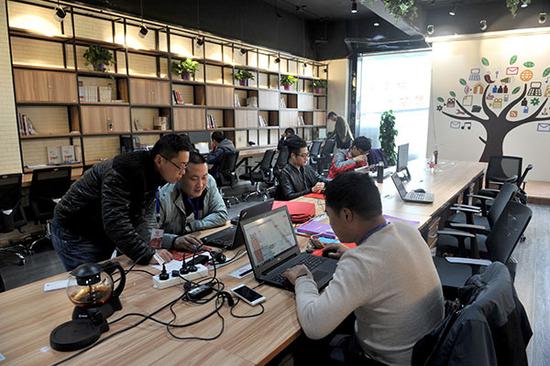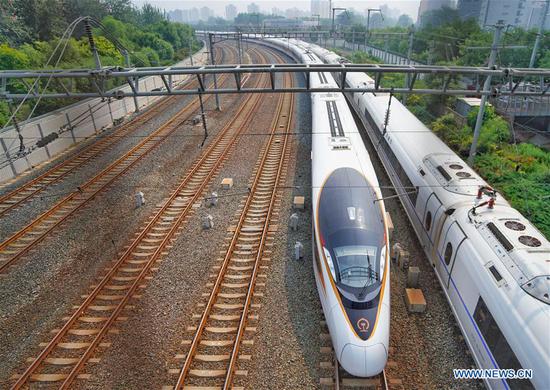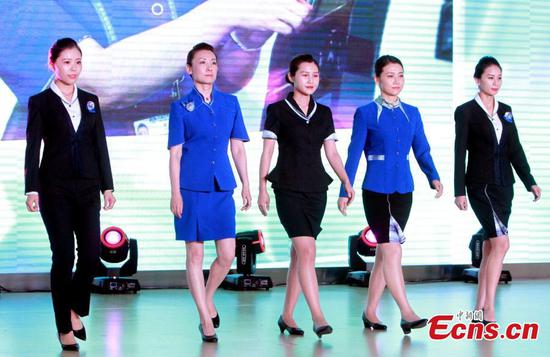
Makers, or founders of startups still in incubation, work at a co-working space, part of an economic and technological development zone in Liaocheng, Shandong province. (Photo by Xu Wenhao/for China Daily)
After rapid expansion over recent years, the co-working space business segment in China is shifting its focus to product upgrades and enhanced management, following the rationalization that saw mergers and acquisitions, or M&As, this year, an industry report stated.
Just like in other sectors related to sharing economy, smaller co-working space firms were acquired by bigger ones. Competition has focused more on quality of services and operation, according to a recent report released by domestic online-to-offline or O2O commercial real estate service platform Haozu and the China Real Estate Chamber of Commerce.
Since 2015, when the country began to promote innovation and entrepreneurship, the business segment of co-working spaces, which entails lower costs, flexible management and diverse services, grew steadily and rapidly.
However, from 2017 to 2018, there were at least eight M&As in the market, suggesting the competition is becoming fiercer.
Among the top 20 brands (valued in terms of business scale, market influence, performance, financing and M&As), four were purchased by Chinese co-working space unicorn Ucommune this year. They were Hongtai New Space, Wujie Space, Wedo Union and Workingdom, according to the report.
After that, the market value of Ucommune was estimated to have reached 11 billion yuan ($1.75 billion) with 160 operations globally, attracting more than 6,000 enterprises.
Mao Daqing, founder of Ucommune, had said M&As can make the most of advantages of each operator so as to promote optimization of services.
For example, Hongtai New Space is good at matching entrepreneurs and investors, as well as incubating startups, and Ucommune can help connect more resources from different industries, he said.
According to the report, market scale of the Chinese co-working space segment reached about 9 billion yuan last year, which is expected to hit 100 billion yuan by 2030 with an annual growth rate of up to 50 percent.
And the top 30 companies will command more than 70 percent of market share, it said.
However, Liu Chengcheng, founder and chairman of co-working space firm Krspace, said irrational M&A activity is not good for the healthy development of the segment.
"Many small companies don't share the same service standards, which may pose a challenge to unified management after the M&A," Liu was quoted as saying in an online media report.
"For example, every three of our employees will manage a 5,000-square-meter co-working space, while other companies may need five or six people. And we provide free tea and beverages, while others may charge a fee for them."
The company expects to have 1.5 million sq m of space by 2019 with 220,000 members, saying direct management can help improve profit and guarantee better user experience.
Kuang Jianfeng, director of the research department of Haozu, said whether or not a company could find an ideal solution to be profitable was key to competing in the market.
Currently, revenue of most operators still comes from rentals, while value-added services barely bring income, he said.
Generally, co-working spaces will provide services such as business matching, recruitment, consultancy and entrepreneurship training for companies.
According to the report, nine of the top 10 co-working space brands have reached over 85 percent occupancy rate. The monthly rental ranges from 500 yuan to 5,700 yuan per desk, some of which were even higher than traditional office space.
"The rentals in Beijing, Shanghai, Guangzhou and Shenzhen are growing, showing more customers have begun to choose co-working spaces, which will dominate the market gradually," Kuang said.
The location has also changed from industrial parks and lower-end office buildings to central urban areas, including the central business districts and financial centers, the report said.


















































